After a first vote missed earlier in the morning, Friedrich Merz, a 69 -year -old training lawyer, obtained, in the second round, 325 votes out of the 630 seats in the German Federal Parliament (Bundestag).
Merz, whose party came at the top of the legislative elections last February, had collected 310 votes during the first round, on 621 votes cast. It took him 316 to access the Chancellery.
This scenario, at the very least unexpected, has the effect of a bomb in the German political world. It reveals, according to the press, the fragmentation of the political landscape as well as the fragility of the coalition which is preparing to govern the first power of Europe, in a world in full geopolitical change and in a Germany where the extreme right stands out as the 2nd political force of the country.
Yet Merz, old road of German politics but having never occupied a government station, had been confident the day before, declaring, with his ally Lars Klingbeil, co-president of the SPD (Social Democratic Party), which he expected a clear majority during the election of the Chancellor in the Bundestag.
Friedrich Merz signed the coalition contract of his new government on Monday between the conservatives of the CDU/CSU (Christian Democratic and Social Union) and the SPD (center-left), promising to “advance” Germany in these times “of great uncertainty”.
Through this contract, Merz, officially appointed Chancellor by German President Frank-Walter Steinmeier following the Bundestag vote, places at the top of his priorities to “restore his pride” and his “leadership” to Germany, the first European economic power, faced with a deep crisis of his industrial model.
-To do this, the coalition contract, harshly negotiated, provides for a vast plan of reforms relating to questions related in particular to taxation, bureaucracy, social policy, migration and defense.
Merz and his future government, which will take an oath this Tuesday, are committed to tax reductions for households and businesses, a decreasing damping for investments made between 2025 and 2027, as well as a drop in corporate tax from 2028.
The coalition also aims to modernize the administration and reaffirms its determination to harden migration policy, in particular through reinforced control at the borders, the abolition of accelerated naturalization, the restoration of the standard period of five years for dual nationality, as well as restrictions on family reunification for certain refugees.
On the military, Germany, whose defense expenses jumped by 28% in 2024 to 77.6 billion euros and place itself in 4th in the world, plans a special fund of 100 billion euros to modernize its army and allow Europe and itself to ensure their own security.
For Merz, Germany must play a driving role within the European Union, assume more responsibilities and reposition itself on the international scene, particularly in terms of security, defense and stability.








